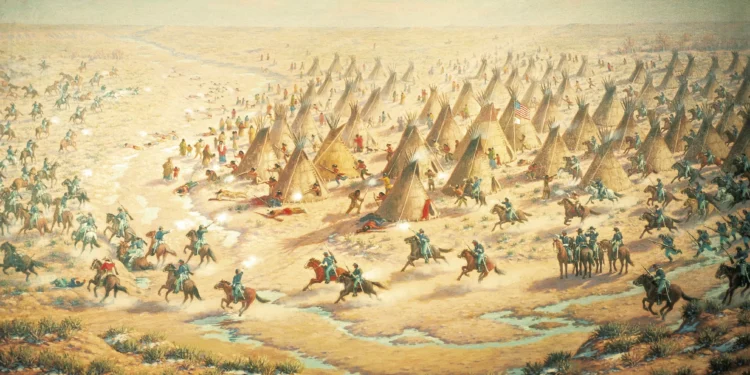After 170 years of violent oppression and cultural erasure, the United States Army has decided to commemorate Native American Heritage Month. This announcement, however, comes with a bitter irony, as the very same military that is now trying to celebrate the legacy of Native Americans is also responsible for their suffering and displacement.
For generations, Native American communities have endured a brutal history at the hands of the US military. From armed attacks to forced relocations, ethnic cleansing, and even genocide, Native Americans have faced unimaginable atrocities in the name of American expansion and progress. The consequences of this violence continue to be felt today, with many Native American communities still struggling to maintain their cultural identity and sovereignty.
So, when the US Army declared its support for Native American Heritage Month, it was met with mixed reactions and a sense of disbelief. How can an institution that has caused so much pain and suffering for Native Americans now claim to honor and celebrate their heritage?
The sad reality is that the US Army has a long and disturbing history of exploiting and oppressing Native American communities. One of the most infamous examples of this is the Trail of Tears, a forced relocation of thousands of Native Americans from their ancestral homelands in the southeastern United States to present-day Oklahoma. The journey, which lasted several months, was marked by disease, starvation, and violence, resulting in the deaths of thousands of Native Americans.
It is notable that the Trail of Tears was carried out under the presidency of Andrew Jackson, who also happened to be a former general in the US Army. It is a dark stain on American history and a reminder of the atrocities committed against Native Americans in the name of manifest destiny.
Even after the Trail of Tears, the US Army continued to wage war against Native American communities, often with devastating consequences. The Wounded Knee Massacre of 1890, where hundreds of Lakota men, women, and children were killed by US soldiers, is another tragic event that serves as a reminder of the violence and trauma inflicted on Native Americans.
Despite this dark history, the US Army now wants to celebrate Native American Heritage Month. While the gesture may be well-intentioned, it is difficult to ignore the hypocrisy and insensitivity of this move. How can an institution that has caused so much harm and suffering now claim to honor and celebrate the very same communities it has oppressed?
The answer lies in the changing attitudes and perspectives within the US Army. While the military has a long way to go in terms of addressing its past wrongdoings and systemic racism, there have been efforts to acknowledge and recognize the contributions and sacrifices of Native American soldiers.
In recent years, the US Army has actively recruited and supported Native American soldiers, recognizing their unique skills and cultural backgrounds. These soldiers have served with honor and distinction, demonstrating their resilience and bravery in the face of adversity. It is only fitting that their contributions are acknowledged and celebrated during Native American Heritage Month.
Moreover, the US Army has also taken steps to honor Native American traditions and cultures within its ranks. From incorporating Native American customs into military ceremonies to creating programs that promote cultural awareness and understanding, the military is slowly but surely beginning to recognize the importance of Native American heritage.
While these efforts may seem small in the grand scheme of things, they are steps in the right direction. It is crucial for the US Army, as an institution, to acknowledge and take responsibility for its past actions and work towards repairing the damage done to Native American communities.
However, it is also essential for the general public to understand the significance of Native American Heritage Month and the need to recognize and celebrate the rich and diverse cultures of Native Americans. This month is not just a token gesture but a reminder of the enduring contributions and resilience of Native American communities throughout history.
So, as we enter Native American Heritage Month, let us not forget the painful past but also acknowledge the strength and resilience of Native American communities. Let us also hold institutions like the US Army accountable for their actions and push for greater understanding and reconciliation between Native Americans and the military.
In the end, it is only through education, awareness, and mutual respect that we can truly honor and celebrate Native American heritage and move towards a more inclusive and just society. Happy Native American Heritage Month.






